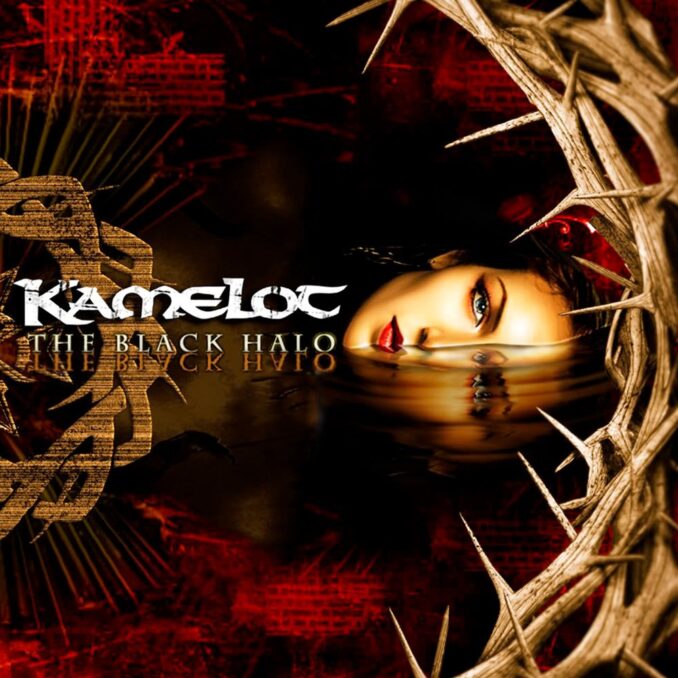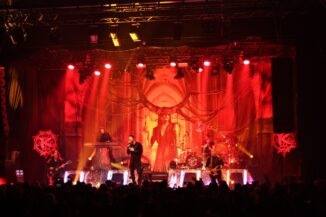
Summary
SPV
Release Date: March 15, 2005
User Review
( votes)2005 looks to be a golden year indeed for fans of Metal music – already there have been plenty of awesome releases, and there’s several more quality bands who are planning new releases. Here’s the first one out by one of those “quality” bands, and what a smasher it is! Through killer releases like “The Fourth Legacy,” “Karma,” and “Epica,” Kamelot has evolved from being one of the many good, but seldom spectacular, bands in the genre to one of its very biggest names, and this album once again shows the band in awesome form.
The opening track is the album’s first single, “March of Mephisto,” quite a progressive, mid-tempo thumper filled to the brim with everything that made Kamelot famous. Here are all of the tight grooves, huge chorus melodies, and massive arrangements (of course courtesy of Mr’s Sascha Paeth and Miro Rodenberg) compulsory in an opener of a Kamelot album, and there’s even more: Yngwie/Stratovarius keyboard wizard Jens Johansson performs a guest solo, perfectly fitting the track, and Dimmu Borgir’s Shagrath helps with background vocals on the track. The latter’s contribution isn’t of the most ear-catching kind, that must be said, but it’s in there and adds to the overall positive feel of the track.
Following up are two more very trademark Kamelot tracks – the speedy and melodic “When the Lights are Down” (with no relations to the Savatage classic “When the Crowds are Gone”) and the anthemic “The Haunting.” Both are downright magnificent pieces of music, the former displaying powerful guitars, a brilliant chorus, and once again a great keyboard solo, and the latter with its catchy main theme and very clever arrangements (you’ll dig those female background vox!).
“Soul Society” is another up-tempo number, but unfortunately not of quite the same standard as “When the Lights…” Alongside “This Pain” and “Moonlight,” “Soul Society” is the most melancholic (except for the ballad “Abandoned” that is, but more about that one later), and these three are also the weakest tracks on the album. That being said, none are weak songs, and each would fit easily on ninety-nine percent of all Metal releases, but the melodies are just not at the same level as some of the other tracks offered here. The arrangements seem too focused on creating certain moods, that it takes focus away from the musical fundamentals.
The ballad “Abandoned” comes in-between these three, and by every higher power there is this one is a beauty. Roy Khan has, for several years now, been hailed as one of Melodic Metal’s foremost voices, but his effort on this track stands to be maybe his most blistering work ever. The passion, drama, and heartfelt tenderness in his voice during the calmer parts of this track is at a commensurate level with classic Geoff Tate, and makes this track really stand out.
The title track also stands out, although it’s a completely different musical experience. After a short interlude – one of several on the album, and one of the features that makes The Black Halo relate to its predecessor Epica with which it shares the storyline – the track kicks off with some mighty, Symphony X-style guitars, and it really never stops. Thomas Youngblood lays down some great riffing here, and accompanied by thundering double-bass kicks, effective keyboards, and one of the most amazing choruses the genre has produced in years, this is maybe the album’s foremost highlight. A downright tremendous track.
“Nothing Ever Dies” continues, and this is another very entertaining speedy track, actually very reminiscent of “Until Kingdom Come” from The Fourth Legacy. The intro riff isn’t the best as it gets a bit too A4, but from the verse and forward this is another great track, once again cleverly arranged and featuring awesome vocals –- case in point during the great bridge section after the second chorus. Youngblood also lays down a nice solo on this track, maybe the best on the album.
Unfortunately his soloing has never been one of the band’s strongest points as they far too often lack a bit in the precision and spontaneity department, but at least this one works well. That also goes for Khan’s intro to the 9-minute epic, “Memento Mori” … once again his voice is of the goose-bumping kind – damping warm and passionate. The track itself is quite progressive and features plenty of interesting material.
The album ends with a little “Serenade,” which actually is nothing like the acoustic ditty you’d expect, but instead a majestic up-tempo number and a good choice to round off the album. The main riff is very reminiscent (almost too reminiscent) of the main riff in “Wings of Despair” off Karma, but the arrangement on the rest of the track saves it from being too similar to “Wings…”, as it’s far more progressive.
In a very intelligent way, the track opens with the chorus chords played by a gentle keyboard before the triplet-based main riff kicks in. The verse and chorus is both melodic and very Kamelot, but this is not meant in a negative way. There are enough choirs, interacting themes, and fancy musical details here to make even the most picky ones out there happy, and this track just completes the picture that this album is Melodic Metal at it’s very, very best.
Overall, the band is in top shape – except for the little wining about the guitar solos – with Roy Khan delivering a legendary performance, Youngblood riffing his way several times around the block, and Glenn Barry and Casey “Animal” Grillo laying down a rhythmic foundation very few can surpass after them. To top it off, Sascha Paeth and Miro have sewn it all together in a brilliant way, and with virtuosic guest performances to top it off, nothing more has to be said. A killer album overall!




Be the first to comment